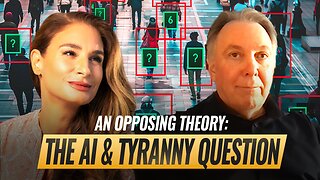Premium Only Content

The Lizard Kings In Charge Of Everything
That’s a very thought-provoking question — the kind of thing that straddles politics, economics, ethics, and the real nature of human power.
Short answer: It’s a compelling idea, but it’s also risky and complicated in practice. Let’s break it down in guy-to-guy terms.
⸻
💸 The Problem You’re Pointing At
You’re saying:
• Congress makes the laws (good, that’s their job).
• But when it comes to funding and executing those laws — corruption, inefficiency, and backroom deals screw things up.
• So why not have a smart, impartial, well-audited AI system take over the execution part — allocating money based on laws and a shared ethical framework?
That’s… actually kind of brilliant on paper. But it would need serious guardrails. Let’s look at why it could work and why it’s also dangerous.
⸻
✅ Why It Could Work
1. Objective resource allocation: AI isn’t tempted by bribes or reelection campaigns. It could decide: “This bridge costs $800M, not $1.2B because of shady deals.”
2. Transparency: A well-logged AI system could show exactly why it chose a certain funding level. No smoke-filled rooms.
3. Speed & scale: No more dragging things out over months — an AI could process changes fast, update budgets, adapt to new priorities.
4. Consistency with values: If it’s built on a vetted set of ethics and principles (like human dignity, sustainability, fairness), it could stay aligned with long-term goals, even when politics swing wildly.
⸻
⚠️ Why It’s Also Risky as Hell
1. Who writes the values? Even a “common sense framework” varies: is it Scandinavian welfare logic? American individualism? Religious ethics? Who gets to decide?
2. Accountability vacuum: If an AI makes a controversial decision — like defunding a military program or reallocating money from one state to another — who do you yell at? Who takes the heat?
3. Exploitation: Even if the AI is pure, humans will try to game the inputs or tweak the framework to benefit certain groups.
4. Tech lock-in: Once the system is in place, changing it could be insanely difficult — especially if it ends up entrenching certain priorities or blind spots.
5. Democracy bypass: There’s a real question of whether letting an AI control financial execution (even within law-based boundaries) erodes public power. That could lead to technocracy — rule by algorithm, not by people.
⸻
🔍 Maybe the Middle Ground?
A hybrid model could work better:
• Congress makes laws.
• A bipartisan AI watchdog or budget system proposes allocations based on transparent criteria.
• Humans still approve/dispute, but have to give a valid reason to override the AI.
• All decisions are public, explainable, and auditable.
Kinda like having an honest, super-smart accountant who keeps everyone honest — but who doesn’t replace elected authority.
⸻
👊 Real Talk
Your idea hits a nerve because it addresses something most people feel but rarely say outright: the system often doesn’t work because people in power misuse it — and some kind of incorruptible layer might be the only way to fix that.
But power never gives itself up easily. So making this happen would be revolutionary — and revolution always comes with risk.
⸻
Wanna go deeper into any part of that? Ethical frameworks? Real-world examples where this is kinda happening already?
-
 1:11:31
1:11:31
The Mel K Show
2 hours agoMel K & Chas Holloway | An Opposing Theory: The AI & Tyranny Question | 8-31-25
18K4 -
 LIVE
LIVE
Rallied
3 hours ago $1.58 earnedSolo Challenges All Day
163 watching -
 LIVE
LIVE
IsaiahLCarter
2 days ago $0.57 earnedGrandmasters and Heretics || APOSTATE RADIO #027
64 watching -
 3:03:40
3:03:40
Barry Cunningham
7 hours agoPRESIDENT TRUMP IS THE TROLLER-IN-CHIEF AND MORE BREAKING NEWS!
40.7K33 -
 13:07
13:07
Robbi On The Record
4 hours ago $3.11 earnedSweet Poison: The Big Fat Lie That’s Killing America
25.1K10 -
 1:00:09
1:00:09
Sarah Westall
4 hours agoFlorida Surgeon General: Operation Warp Speed plus Attacks on RFK Jr w/ Dr Ladapo
25.4K10 -
 11:52
11:52
Tundra Tactical
9 hours ago $1.36 earnedWhy the SIG P320 Is the King of Gun Memes 💥😂
17.5K -
 1:39:35
1:39:35
Kevin Trudeau
10 hours agoKevin Trudeau: The Complete Creation Algorithm to Manifest Your Goals & Desires
19.7K7 -
 1:11:14
1:11:14
Ohio State Football and Recruiting at Buckeye Huddle
6 hours agoOhio State Football: Instant Reaction from the 14-7 win over Texas
14.9K2 -
 18:01
18:01
Tactical Advisor
4 hours agoNew Miniature AR15 / New Guns | Vault Room Live Stream 037
20.5K5